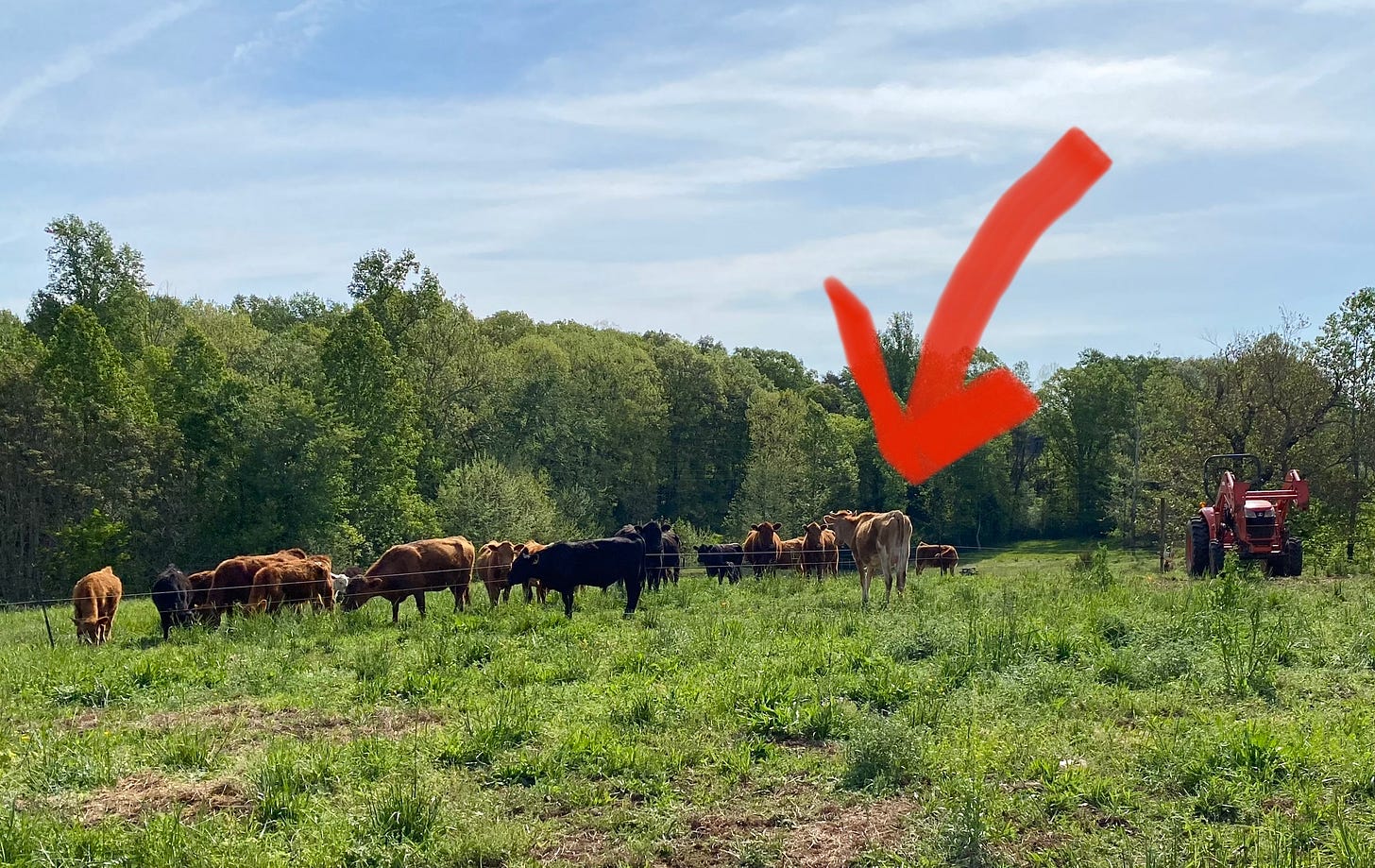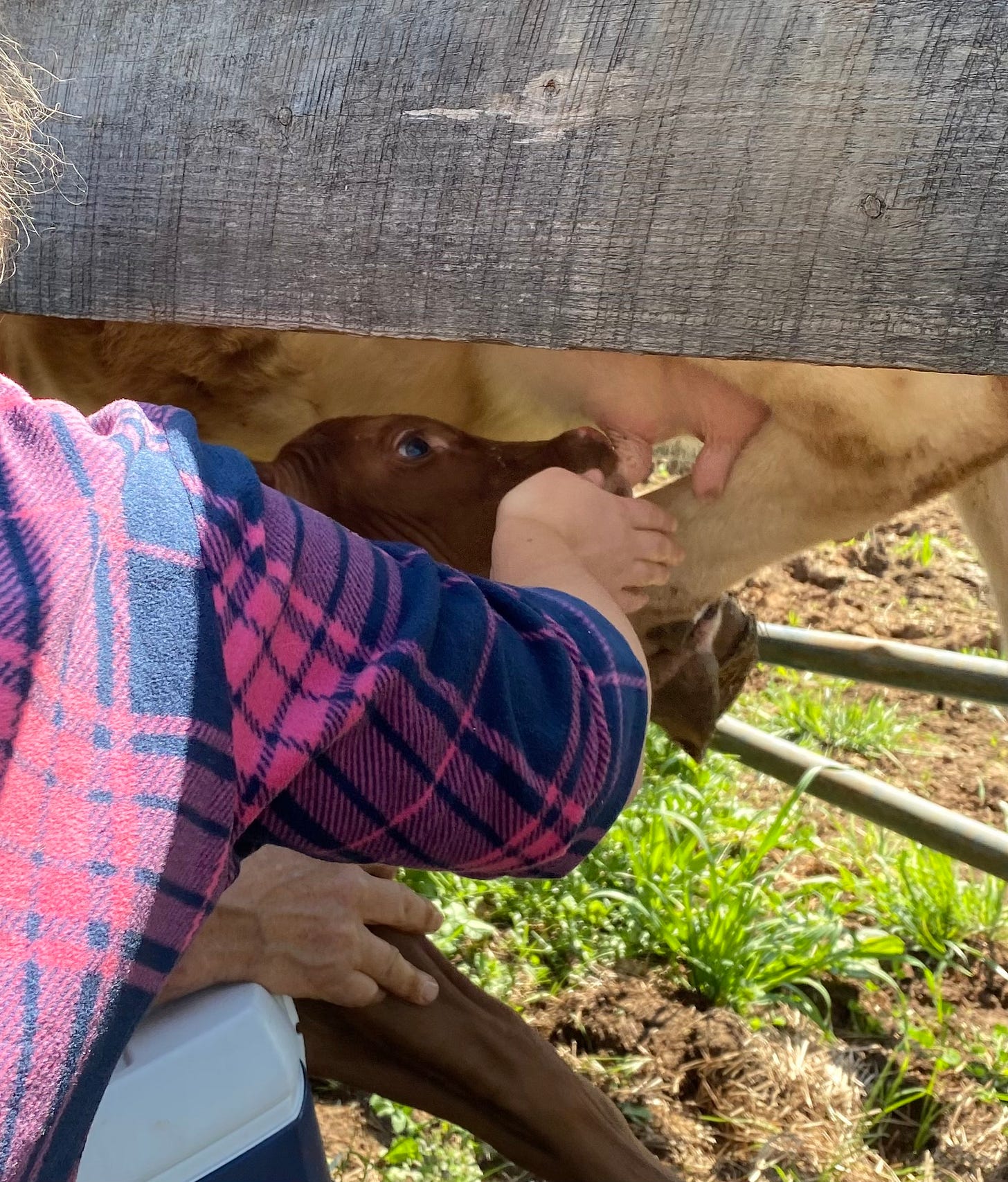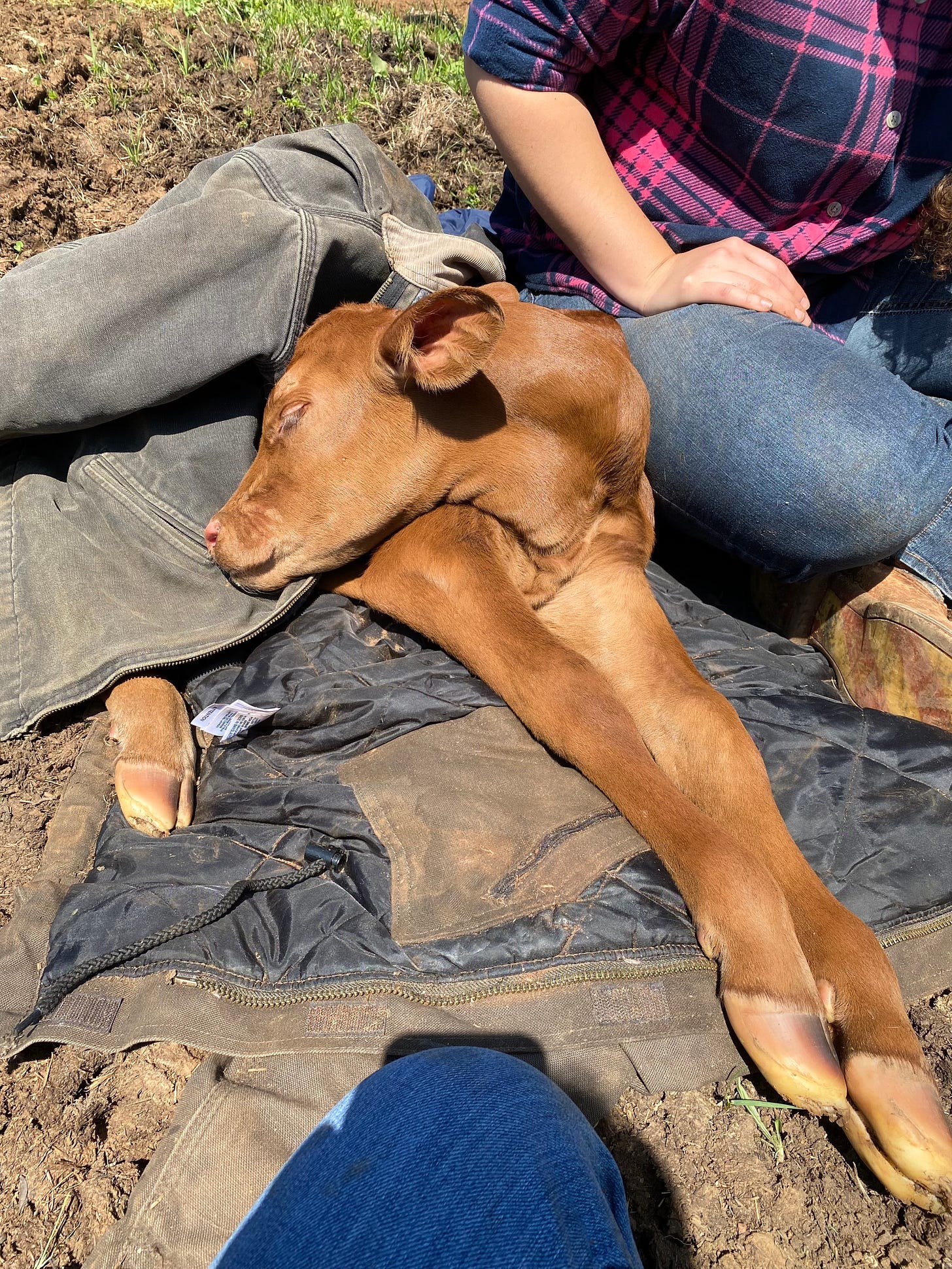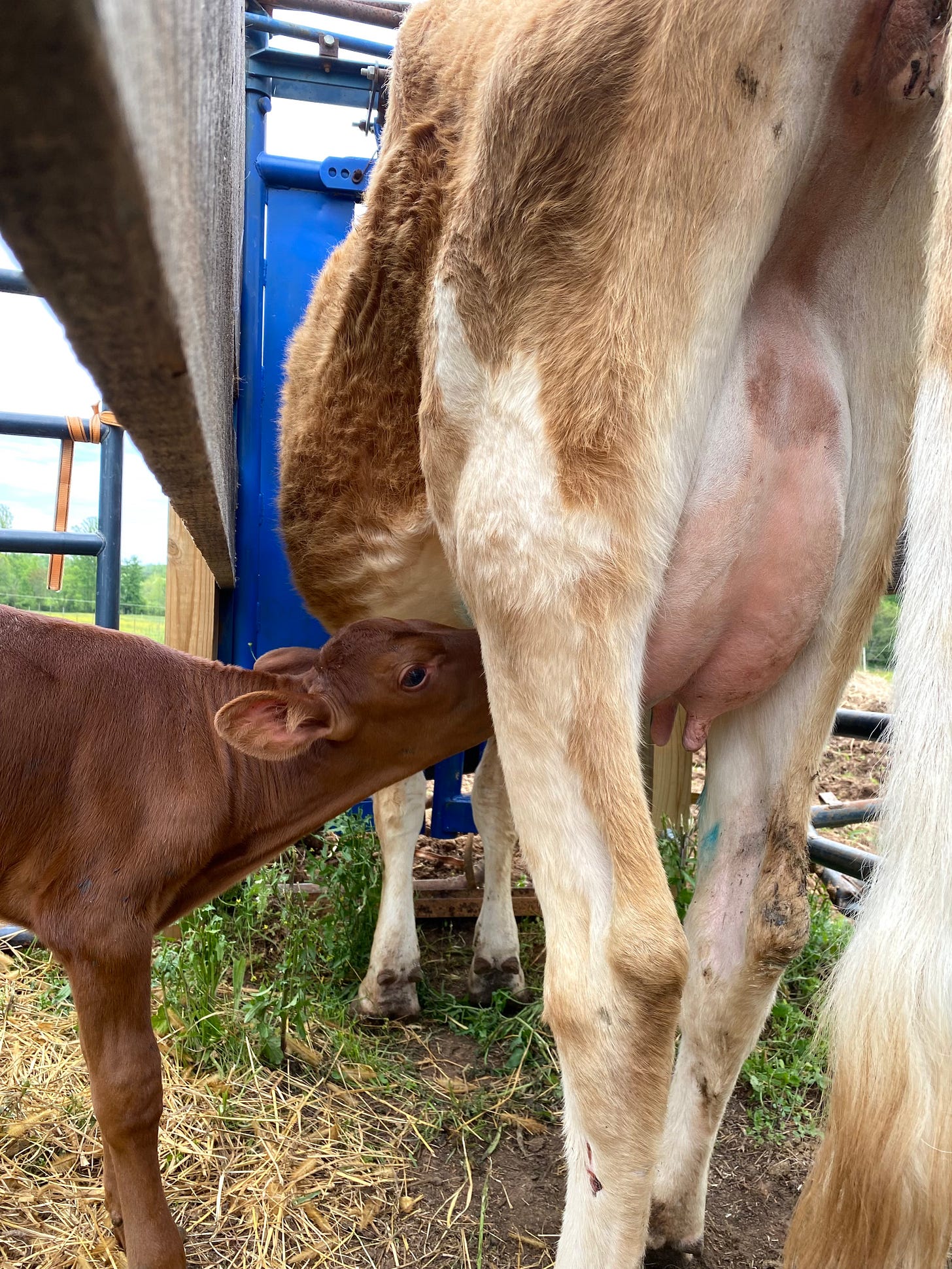Little Poppy-seed
Nine years ago when Ben said he wanted to start raising cattle, we had the now-famous conversation that went like this:
Ben: I have an idea! We’re going to raise cattle!
Me: What? You’re crazy! We don’t know anything about cows, especially not cows that people will eat.
Ben: What’s to know? You put them in the field and they eat grass. How hard can it be?
In the years since that exchange, we have learned how hard it can be, and it’s harder than you think, which is why beef is so expensive. If it were easy, everyone would do it.
While there is a lot of truth to putting them in the field and them eating grass, there are other factors to consider. One of them was born Tuesday morning.
I was sitting on the couch in my basement office quietly reading the last chapter of Acts when my phone rang and I saw it was Ben. That’s not usually a good thing at this hour of the day.
I answered and could hear that he was struggling with something. I asked him what was going on and he told me Sweetheart (our dairy heifer) had calved and the calf was struggling. He found the calf that morning, dried off but shivering. She was weak and could not stand—couldn’t even hold her head up. He had her wrapped in all the coats he could find in the barn and was rubbing her vigorously, but he needed me to come help.
When I got there, we loaded the calf into a feed trough and wrapped her up. We needed to get Sweetheart and the calf down to the working pen at the other end of the farm. So we got Mama separated from the rest of the herd (plus one other cow, who we would deal with later) and set up temporary wires to create an alley down to the working pen. Our cattle are trained to respect electric wires and they will (almost) always stay within them. Here’s Mama, more concerned with fresh grass than with her calf, wanting to get back with the herd but not willing to cross the wire.
Ben hooked the tractor to the feed trough, threw in some grain, and started rolling. Mama followed just like we knew she would. She didn’t care so much about her calf as about the sweet feed. Heifers (first-time moms) can be stupid like that.
Ben pulled the whole thing right into a small pen that has two head gates. One we use for working cattle (shots, castrating, worming) and the other is for situations just like this, with an opening on the lower part of one side so we can steer a calf to its mama’s food source.
By this time our friend and farm helper JK was there. We got Mama in the head gate eating grain and I had made a bottle of colostrum replacement. Our plan was to first try to get the calf to latch onto Mama, which would be best. Since she couldn’t stand and newborn calves are way heavier than you think, we had a little cooler to prop her up on (you can also use a bale of hay, but we buy our bales in 4x5 foot rolls, so that wasn’t an option).
We worked with the calf for a while, but she was pretty weak and we decided she just needed some food. JK and I were able to get some colostrum replacer in her and by then she was exhausted and needed a nap. Calves are like babies in that they eat, sleep, and poop—mostly sleep.
While she was napping, JK and I discussed names. When we first started farming, my practice was to name all the heifers after flowers. Then we had too many to keep track of and we resorted to calling them by their tag numbers. But every once in a while a special one comes along and I feel the need to name her, as if having a name will give her the will to live. We named this one Poppy, and since she’s so skinny, I started calling her our little Poppy-seed.
After a good nap in the sun, we got Poppy on her feet and put her under Mama again.
She’s so skinny! She still couldn’t quite get the nursing thing, so we got more of the colostrum replacer in her and let her go back to sleep. What we really wanted was to get Mama’s colostrum in her since that would be the absolute best thing for her. Lucky for us, JK is a champion milker.
And listen, if you’ve never tried to milk a cow’s colostrum into a bottle, you don’t know a good shoulder workout. Colostrum is very thick and sticky, the bottle opening is small, and it’s hard to get two people in there at once. JK milked over a quart of it and totally earned her pay.
That night Ben and I went back with the heated colostrum and Poppy sucked down every drop of it. Who wants the fake stuff when you can have what Mama makes?
The next morning we went out with more replacer. While Ben was getting set up to put Mama in the head gate, I was rubbing Poppy like Mama would, and the calf suddenly jumped to her feet. This was the first time she’d done that and I was so surprised. She took a few steps on her own, so we decided to get her under Mama and see if we could get her to nurse.
She tried but just couldn’t quite get the hang of it, so when she was tired, we got some of the bottle in her and left her to nap. JK and I went out at lunchtime and repeated the process.
Then Ben went out Wednesday evening and Poppy got up again. He pushed her up under Mama and gave her some coaching and finally got her nursing a little bit. Our hope is, now that she knows where the milk is supposed to come from, she will get in there and work for it. But this is huge progress in just 24 hours and we are thankful.
Thursday Poppy had a visit with the vet and got a few shots of vitamins and minerals, an antibiotic for respiratory issues, and scours medicine, kind of like Pepto Bismol for cows. After a good nap, she was up and nursing 3 quarters, which is great for a 2-day-old calf.
I say all the time that a farm is chock-full of spiritual lessons, and this event is one of them.
In 1 Peter 2:2 it says,
As newborn babes, desire the sincere milk of the word, that ye may grow thereby
It’s hard to believe that a newborn baby would not desire milk, but occasionally it happens. I knew a family once whose baby was born with no sucking reflex. He didn’t want milk. God knew this would happen now and then, so he tells us—commands us—to desire the milk of the word. He can’t force it down us; we have to go looking for it. We have to want it, seek it, root around until we find the source of it, then keep going back for more.
Why? So we “may grow thereby.” Growth doesn’t come without the milk—for a calf physically or for us spiritually. We don’t grow in Christ any other way than by getting the milk of the word, and later the meat. One time won’t do; we need a steady diet of it. A little bit every day, and we get stronger and healthier and pretty soon we’re a big cow producing the fruit God intended for us.
Here’s to little Poppy-seed, teaching us how to grow.














Hey Karen, this was a great read. Thank you for sharing this reminder. God uses things around us everyday to reveal himself to us!
Love this!